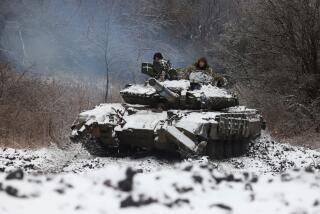Putin describes ex-Russian spy poisoned in Britain as ‘scum’ who betrayed his homeland
- Share via
Reporting from Moscow — Sergei Skripal, the former Russian spy who was poisoned in Britain with a Soviet-made nerve agent, is a “traitor” and “scum,” Russian President Vladimir Putin said Wednesday.
“Some media outlets are trying to put forward the idea that Skripal was practically a human rights defender,” Putin said in opening remarks at an international energy forum in the Russian capital. “He is simply a spy and a traitor to his country. He is just scum, and that’s it.”
Skripal, 67, a former Russian military intelligence officer, and his daughter, Yulia, 33, were found slumped over on a bench in March near his home in Salisbury, England. A British investigation found that the two, both of whom survived, had been poisoned by a military-grade nerve agent called Novichok that was developed in the former Soviet Union.
Britain has blamed the Kremlin for attempting to assassinate the father and daughter, saying two Russian military intelligence agents carried out the poisoning. The Kremlin has denied the accusations.
Both Skripals had long hospital stays, while a second woman in the same city died, investigators said, after she came into contact with a fake perfume bottle used to transport the nerve agent.
Putin has never taken kindly to those he believes have turned their backs on Russia. A former KGB agent himself, he has said in the past that traitors should be killed.
“Traitors will kick the bucket,” Putin said in a 2010 Russian TV interview.
On Tuesday, Russian Foreign Ministry spokeswoman Maria Zakharova suggested that British officials’ refusal to allow Russia to participate in an investigation indicated that they were trying to hide the truth.
“It is yet more evidence that London is pursuing provocative anti-Russian goals in its propaganda campaign over the so-called Skripal case,” she said, according to Russian media reports.
Skripal was sent to prison in Russia after being convicted of treason in 2006 of passing secrets to Britain. He was granted asylum in Britain as part of a spy exchange between Russia and the U.S. in 2010.
Putin’s comments Wednesday came amid media reports detailing connections between the two men accused of poisoning the Skripals and Russia’s military intelligence agency.
British police have released security camera images they said showed the men traveling to the U.K. under the aliases of Alexander Petrov and Ruslan Boshirov. The men, suspected to be Russian military intelligence agents, appeared walking near the Skripal home in Salisbury on the day before and the day of the poisoning.
The Kremlin denied the men were known to Russia’s intelligence services. And on Sept. 12, Putin told reporters at an economic summit in Russia’s far east that the Russian government had identified the men as “civilians” who would soon reveal themselves publicly.
The following day, two men appeared in an exclusive interview with Kremlin-funded RT television. In the interview, the men said that they were the pair in the British security video clips, and that their names were Petrov and Boshirov. They had made the 6,000-mile round trip from Moscow to Salisbury in three days, they said, simply as tourists hoping to see the southern English city’s famous cathedral spire and clock.
The two men described themselves as businessmen in the fitness industry and denied any involvement in the Skripal poisoning.
The interview sparked memes and jokes on the Internet about the popularity of Russian tourism in small English cities.
Since then, media reports have surfaced that Boshirov may actually be Anatoly Chepiga, a decorated colonel in Russia’s military intelligence agency.
When asked about Chepiga’s identity, Kremlin spokesman Dmitry Peskov angrily told reporters on Sept. 28 that just because an image looked like someone, it doesn’t mean it is that person.
Citing the presence of impersonators in the heart of Moscow, Peskov said, “We have 10 Stalins and 15 Lenins on Red Square, and all of them closely resemble the real ones.”
On Tuesday, Ukraine’s interior minister, Arsen Avakov, offered more to the speculation of the Skripal suspects’ past. At least one of the men has been identified by Kiev investigators, he said, as having been involved in helping former Ukrainian President Viktor Yanukovich escape from Kiev during 2014 anti-government protests, which forced the Russia-friendly leader to flee for Russia.
Twitter: @sabraayres
Ayres is a special correspondent.
More to Read
Sign up for Essential California
The most important California stories and recommendations in your inbox every morning.
You may occasionally receive promotional content from the Los Angeles Times.











